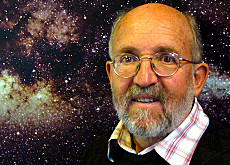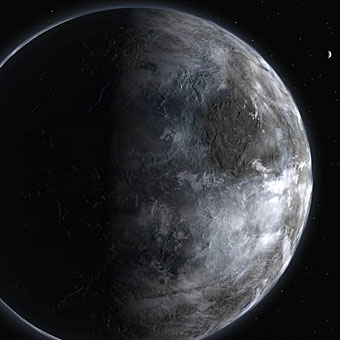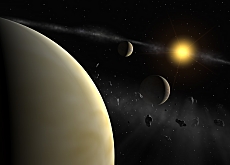Planet hunter keeps his feet on the ground

Is there life elsewhere in the Universe? Swiss planet hunter Michel Mayor would love to know but tells swissinfo he prefers scientific facts to speculation.
A few weeks after announcing the discovery of a planet 20 light years away that could potentially support life, Mayor is keeping his feet firmly on the ground and planning his retirement from his teaching duties at Geneva University.
The astrophysicist has been leading the pack of planet hunters since the mid-1990s. With his colleague Didier Queloz, he was the first to announce the discovery of planet outside our solar system.
Yet for all his fame in the scientific community, you would be hard-pressed to find out what encourages him to look into deep space. In his rather austere office, there is only one science fiction book, and Mayor admits he has seen only one episode of the Star Wars saga – although he says he did enjoy it.
swissinfo: Science fiction apparently seems to have not been a source of inspiration to you?
Michel Mayor: Certainly not. I enjoy the odd book or film, but I’m not addicted to the genre.
When I was a child, I had a passion for natural science. I chose to study physics because it was what suited me best, but when I finished my degree I could have moved into geology, vulcanology or even oceanography. At the time, physics was being applied to all sorts of fields.
It’s true though that when I was a Scout, I was the “astronomer”. Aged eight, that means recognising constellations. Later I took courses for amateur astronomers, where I learnt to look through a telescope.
swissinfo: And does today’s astrophysicist still peer through a telescope?
M.M.: No. A typical laboratory at a major observatory is a control room with lots of computer screens. From there, you set up the telescope, the measuring instruments – you analyse the data. For us, the screens just show curves and graphics. Our other colleagues, who use other kinds of instrument, get to see pictures of the sky.
swissinfo: Those graphs only give you indirect proof of the existence of other planets. Do you ever dream of finding life there?
M.M.: Yes, especially since I’m convinced that life has a good chance of existing under the right conditions. Unfortunately my imagination gets reined in by my science, which tells me that the likelihood of encountering an evolved life form is extremely limited.
[Greek philosopher] Epicurius had already thought of different planets and types of life. In his “Letter to Herodotus” he wrote that there was no reason for Nature to have used up all the possible combinations of atoms to create only the Earth. It’s a fabulous idea that dates back 2,300 years!
We now have technology that enables us to tackle the problem from a scientific perspective – and maybe get some answers. So it’s of enormous interest to me.
But that said, if space telescopes show us in 20 years planets outside our solar system with strong concentrations of oxygen in their atmosphere – and the probable presence of life – we will still be frustrated.
From a philosophical point of view such a discovery would be extremely important, but we still won’t know what kind of life it is. So I prefer to turn my imagination to what we can do now to improve our instruments. That seems more exciting to me that to fantasise about something that’s nothing more than daydreaming.
swissinfo: Did observing the sky help you find faith?
M.M.: No. I certainly admire nature, but in my view astronomy doesn’t encourage religious belief any more than observing an animal or a child. There’s plenty to marvel at just there.
swissinfo-interview: Marc-André Miserez
Born in 1942 in Lausanne, Mayor received his PhD at Geneva University in 1971 with a thesis on the dynamics of spiral galaxies.
While he was working on his thesis, he built his first spectrometer – an instrument that analyses light – to measure the speed of stars.
In 1995 he announced the discovery of 51 Peg b, the first planet found orbiting a star other than the Sun.
Over the past 12 years, researchers have found 250 of these so-called exoplanets, with Mayor’s team accounting for about half the discoveries.
Most of the Swiss astrophysicist’s work is done using an instrument called the Higher Accuracy Radial Velocity Planet Searcher (HARPS), an instrument installed on a 3.6-metre telescope at the European Southern Observatory (ESO) at La Silla in Chile.
HARPS measures variations of the radial velocity of stars, a sign that another body such as a planet is close by.
Mayor will retire from his teaching duties this summer but will continue to work at the ESO.

In compliance with the JTI standards
More: SWI swissinfo.ch certified by the Journalism Trust Initiative











You can find an overview of ongoing debates with our journalists here . Please join us!
If you want to start a conversation about a topic raised in this article or want to report factual errors, email us at english@swissinfo.ch.